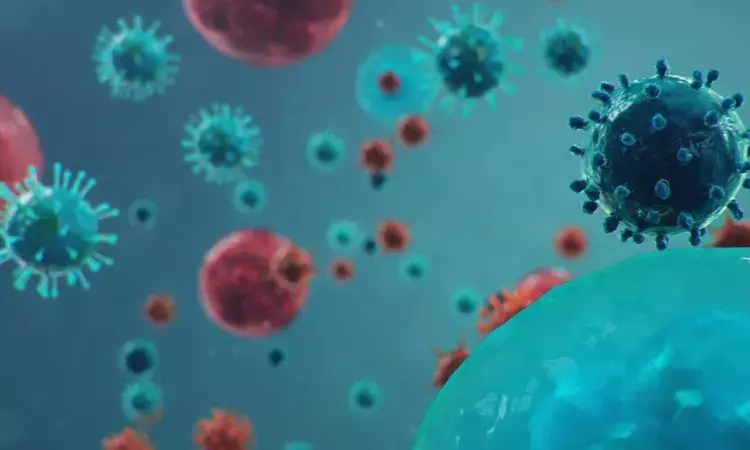- Home
- Medical news & Guidelines
- Anesthesiology
- Cardiology and CTVS
- Critical Care
- Dentistry
- Dermatology
- Diabetes and Endocrinology
- ENT
- Gastroenterology
- Medicine
- Nephrology
- Neurology
- Obstretics-Gynaecology
- Oncology
- Ophthalmology
- Orthopaedics
- Pediatrics-Neonatology
- Psychiatry
- Pulmonology
- Radiology
- Surgery
- Urology
- Laboratory Medicine
- Diet
- Nursing
- Paramedical
- Physiotherapy
- Health news
- Fact Check
- Bone Health Fact Check
- Brain Health Fact Check
- Cancer Related Fact Check
- Child Care Fact Check
- Dental and oral health fact check
- Diabetes and metabolic health fact check
- Diet and Nutrition Fact Check
- Eye and ENT Care Fact Check
- Fitness fact check
- Gut health fact check
- Heart health fact check
- Kidney health fact check
- Medical education fact check
- Men's health fact check
- Respiratory fact check
- Skin and hair care fact check
- Vaccine and Immunization fact check
- Women's health fact check
- AYUSH
- State News
- Andaman and Nicobar Islands
- Andhra Pradesh
- Arunachal Pradesh
- Assam
- Bihar
- Chandigarh
- Chattisgarh
- Dadra and Nagar Haveli
- Daman and Diu
- Delhi
- Goa
- Gujarat
- Haryana
- Himachal Pradesh
- Jammu & Kashmir
- Jharkhand
- Karnataka
- Kerala
- Ladakh
- Lakshadweep
- Madhya Pradesh
- Maharashtra
- Manipur
- Meghalaya
- Mizoram
- Nagaland
- Odisha
- Puducherry
- Punjab
- Rajasthan
- Sikkim
- Tamil Nadu
- Telangana
- Tripura
- Uttar Pradesh
- Uttrakhand
- West Bengal
- Medical Education
- Industry
Gut fungi worsen lung inflammation and have lasting impact on immune response in severe COVID-19

Two Covid Deaths in 48 Hours Raise Alarm in Ahmedabad
USA: A recent study has suggested that gut fungal microbiota may contribute to immune activation during inflammatory diseases, offering potential mycobiota-immune therapeutic strategies for severely ill COVID-19 patients with prolonged symptoms.
"In patients with severe COVID-19 (sCOVID-19), some kind of fungi can thrive in the intestines, worsening the virus's characteristic inflammation and leading to an outsized immune response against the fungi for up to 1 year following the infection," the researchers reported in Nature Immunology. "This discovery identifies a group of patients who may benefit from specialized, but yet-to-be-determined treatments."
Takato Kusakabe, Joan and Sanford I. Weill Department of Medicine, Weill Cornell Medicine, New York City, NY, USA, and colleagues analyzed blood samples from severe COVID-19 patients, finding immunoglobulin G (IgG) antibodies against fungi commonly found in the gut and an increase in neutrophil immune cells in the lungs.
Then, mouse models were used to confirm that fungi in the gut, particularly strains of Candida albicans yeast, provoked the production of more neutrophils in the lungs and blood. The mice also showed signs of inflammation when infected with SARS-CoV-2.
The researchers reported the following findings:
· Patient blood samples showed signs of persistent immune-system changes believed to be related to long COVID.
· At 1 year postinfection, the blood still contained antifungal antibodies, and stem cells that give rise to neutrophils were primed to attack fungi.
· The immune protein interleukin-6, induced by fungi, seemed to increase levels of both neutrophils in the lungs and fungal antibodies.
· The use of IL-6 blockers or antifungal drugs in patients or mice, however, reduced levels of neutrophils and fungal antibodies.
· Patients treated with the anti-inflammatory drug tocilizumab saw sustained reductions in IgG antibodies against both C albicans and neutrophil progenitors.
“Severe and long COVID-19 were not thought to involve fungal blooms in the intestines that, in addition to the virus, can impact patient’s immunity,” senior author Iliyan Iliev, of Weill Cornell Medicine, said in a college news release.
From within patients’ blood samples, the investigators also uncovered evidence of persistent changes to the immune system they believe are related to a condition known as long COVID-19, in which symptoms linger, or new ones develop after clearing off the infection.
According to the authors, the findings do not change the guidelines for the treatment of severe or long COVID-19 but, someday, they may lead to tailored treatment, such as using antifungal antibodies to identify patients eligible for a therapy targeting the fungi or the immunologic changes they trigger.
The antifungal antibodies may also be a marker of increased risk of long COVID or other infectious inflammatory conditions.
Reference:
Kusakabe, T., Lin, WY., Cheong, JG. et al. Fungal microbiota sustains lasting immune activation of neutrophils and their progenitors in severe COVID-19. Nat Immunol (2023). https://doi.org/10.1038/s41590-023-01637-4
Dr Kamal Kant Kohli-MBBS, DTCD- a chest specialist with more than 30 years of practice and a flair for writing clinical articles, Dr Kamal Kant Kohli joined Medical Dialogues as a Chief Editor of Medical News. Besides writing articles, as an editor, he proofreads and verifies all the medical content published on Medical Dialogues including those coming from journals, studies,medical conferences,guidelines etc. Email: drkohli@medicaldialogues.in. Contact no. 011-43720751


